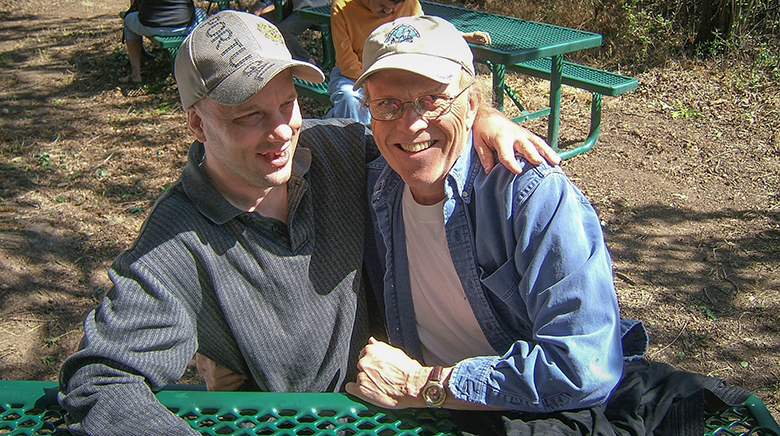
Al Cook, former dean of the Faculty of Rehabilitation Medicine (right), retired from the University of Alberta in 2014. Cook is writing a book about societal views of intellectual disabilities, taking inspiration from his own family including his son Brian (left). (Photo courtesy Al Cook)
(Edmonton) Al Cook barely knew his big sister Elizabeth, sent away from the family home in Colorado for being born "an idiot." That's how people with intellectual disabilities were labelled in the 1930s, when marginalization and institutionalization were the standard in care.
By the time Elizabeth turned 12, she was incarcerated as an inmate in the State Home and Training School for Mental Defectives.
"At the time, the only way people with intellectual disabilities were handled, the only ways families could deal with them was institutionalization. There were no resources or help in the community," remembers Cook, a professor emeritus and former dean of the Faculty of Rehabilitation Medicine.
Elizabeth remained institutionalized until 1994 when a physician convinced Cook's mother that his sister's quality of life was so poor, there was no point keeping her alive. She died the day before his interview for the dean's position with the Faculty of Rehabilitation Medicine.
"I didn't really know her very well. I have all the records from her institutionalization, from the time she was placed there until she ... left in the 1990s," Cook says.
In 1968, Cook's son Brian was born with what was then called mental retardation. Attitudes about disabilities had advanced since Elizabeth was born, but only to a certain point.
"When my wife, Nancy, went in for a six-week [postnatal] checkup and the first thing the doctor said was, 'You know this is your fault, don't you?' There was no medical diagnosis of what went wrong."
Son's birth changes career focus
That experience, and the desire to see Brian thrive, would forever alter the family's life-and Cook's career as a young biomedical engineer interested in the neurosciences.
"I realized there were technologies that could be used to help people with disabilities. That's what got me into rehab in the first place, and assistive technologies," says Cook.
While at California State University in Sacramento, Cook started collaborating with a speech-language pathologist, using technology to help people with disabilities communicate. Those collaborations gradually expanded to include a psychologist and eventually Cook went on to serve as co-director of the Assistive Device Center in Sacramento, helping over 500 persons with disabilities to identify and obtain assistive technologies.
In the early 1980s, the Glenrose Rehabilitation Hospital hired Cook as a consultant to evaluate possible services in assistive technology-efforts that led to the creation of the I Can Centre in 1983. His interactions in Edmonton and at the Glenrose grew to the point where colleagues encouraged him to apply for the dean's position in Rehab Med.
As dean, Cook led the faculty through the transition from offering undergraduate degrees to graduate programs, which took a lot of convincing provincially. His tenure also coincided with an increase in funding that allowed the faculty to expand its recruitment and research focus.
As chair of the Health Sciences Council, he pushed for more interdisciplinary study, recognizing that health professionals are part of a care team that shouldn't operate in silos. Those efforts led to the creation of the Edmonton Clinic Health Academy and the Health Sciences Education Research Commons.
Through it all, Cook continued to pursue his own research and using robots to help children with disabilities learn and engage in play, particularly those with limited motor skills. The rewards were often visible on the faces of the kids' parents, he says.
"I love the U of A. That was probably the most rewarding 20 years of my life. It's an amazing institution and I'm very proud of the Faculty of Rehabilitation Medicine."
- Al Cook, professor emeritus.
Since retiring and relocating to California, Cook has used his newfound time to focus on writing, including the fourth edition of his groundbreaking textbook on assistive technology.
"It's had a major impact on assistive technology around the world and that's all due to Brian."
His thoughts often return to Elizabeth and Brian and how societal views of intellectual disability have changed just during their lifetimes, which is the subject of a new book he's working on. In it, he places their lives in the context of historical events and how people with intellectual disabilities were treated, from the eugenics movement to Nazism to a 1940s speech delivered to the American Psychiatric Association that called for the killing of all disabled children under the age of five-an opinion supported by a now astonishing 47 per cent of the public.
"Looking at differences in Brian's life and Elizabeth's life is reassuring that we can make progress," says Cook, but adds we have a long, long way to go. "What I would really like to do is affect the way people think about something. In this case, the way people think about intellectual disability."
And although he's now removed from campus, the U of A remains close to his heart.
"I love the U of A. That was probably the most rewarding 20 years of my life. It's an amazing institution and I'm very proud of the Faculty of Rehabilitation Medicine. It's a remarkable place where really good things happen."
A version of this story originally appeared in Rehab Impact report 2013-14.
